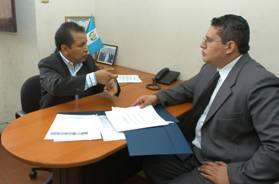Guatemalan national security system ratified by congress

March 2008 - The Guatemalan Congress took a vital step to resolve the problems of insecurity in Guatemala when it passed into law a comprehensive National Security Strategy which Interpeace and its local Guatemalan partners played a central role in developing. This law creates a new National Security System, the highest coordination mechanism on security and defence issues, and a National Security Council which includes the President, the Ministers of Interior, Foreign Affairs and Defense, the Secretary of State Intelligence and the Attorney General.
Other provisions of the law include: the Secretariat of Strategic Intelligence (SIE) is responsible to provide strategic intelligence to the President; creation of a Coordinating Entity for Intelligence Matters, made up of the Department of Military Intelligence, the Directorate of Civil Intelligence and the SIE, to provide intelligence on security issues to the National Security Council; and the creation of a Legislative Commission on Matters of Intelligence and National Security which establishes judicial and citizen control on issues of security and intelligence and seeks to enshrine the concepts of democratic security and respect for human rights in the actions of the institutions responsible for security.
Since 2000, Interpeace has played an important role in the drafting and promotion of this important law, when its POLSEDE project drafted an initial proposal for a National Security System. The follow-up project, called FOSS has been a key catalyst and player in facilitating the rapprochement between civil society, the state, and government ministries involved on security related issues. It facilitated discussions on the National Security System with the participation of political parties, the Ministry of Defense, the President's Peace Secretariat, the President's Advisory Security Council and civil society organizations. This process culminated in the presentation of a blueprint for the National Security System, to the then President of the Republic, Oscar Berger, which he endorsed.
In 2007 the initiative was submitted to the Congress of the Republic and the project, through its liaison office with Congress supported the law and lobbied the political parties represented in Congress, which finally succeeded in the approval of the Law.
******
Interpeace began work in Guatemala soon after the signing of the 1996 Peace Accords, which brought an end to 36 years of civil war. The focus of its work has been to strengthen and facilitate the implementation of the component of the Accords dealing with redefining the role of state security institutions and strengthening the role of civil society in security sector issues.
Together with local Guatemalan civil society partners, and over the past 12 years, Interpeace has implemented 3 projects on democratic security policy (project known by its Spanish acronym "POLSEDE"), civilian security policy (known as POLSEC), and most recently a project to strengthen the capacity of civil society on security issues ( "FOSS" ). Interpeace is now launching a project to work on one of the major issues of insecurity in Central America, the youth gangs phenomenon-maras- with a focus on Guatemala, Honduras and El Salvador.
Interpeace's Regional Office is based in Guatemala City and manages the FOSS project in Guatemala and the youth gang project.
